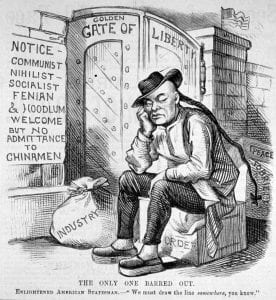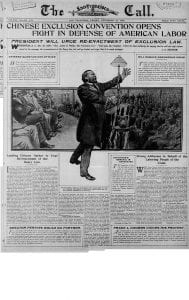Chinese Exclusion Act

The Chinese Exclusion Act was a United States federal law that was passed by Congress and signed by President Chester A. Arthur in 1882, and is the very first significant law restricting immigration into the United States. Upon signing into law, the Chinese Exclusion Act required that people of Chinese origin carry identification certificates. Anyone with Chinese origin found without these certificates would be forcibly deported. In the following years, Congress continued to restrict the freedoms granted to Chinese immigrants, by restricting their access to bail bonds, and severely restricting the types of people that could immigrate based on occupation, such as diplomat or teacher. This Act was later extended to last another decade in 1902 with the passage of the Geary Act, and then given an indefinite extension in 1904. This Act was only repealed in 1943 by the Magnuson Act, when China became an ally of the United States in World War II.
At the time of signing, Congress was riding on a wave of anti-Chinese sentiment. In the middle of the 19th century, there was a high volume of Chinese laborers who found typically dangerous or undesirable jobs such as mining, railway construction, and food service. Despite that, the Chinese were frequently viewed as competitors for jobs and supposedly deflated high American wages, even though the Chinese were only a small minority of the American population.

The aftermath of this acts signing dramatically decreased the number of Chinese immigrants residing in the United States by making it almost impossible for the Chinese to enter America, and placed many Chinese immigrants under close government scrutiny. This policy was in part, responsible for the formation of the Angel Island Immigration Center, where Chinese immigrants would wait for years in the hopes of successfully immigrating.
The greater impact of the Chinese Exclusion Act reaches beyond the simple restrictions on immigration in its time. By creating strict standards on what it took to immigrate into America, this Act made the very idea of becoming an “American” exclusionary, while painting a foreign minority as exotic, and unassimilable. Many common stereotypes for Asian Americans, such as the model minority myth and male emasculation, were formulated during these tumultuous years, and, unfortunately, continue to resonate within America today.
Back in 1882, the Chinese Exclusion Act reflected the mounting hostility of Americans towards immigrants of a specific nationality, eventually creating a new series of policies that would transform America into a country welcoming immigrants and globalization into one that turtled up in isolation. Now that America is reliving the 19th century, it is more important than ever to reflect upon what happened then, and think about the kind of country the United States should be.
Sources:
https://www.britannica.com/topic/Chinese-Exclusion-Act
https://www.ourdocuments.gov/doc.php?flash=false&doc=47
https://www.history.com/topics/immigration/chinese-exclusion-act-1882